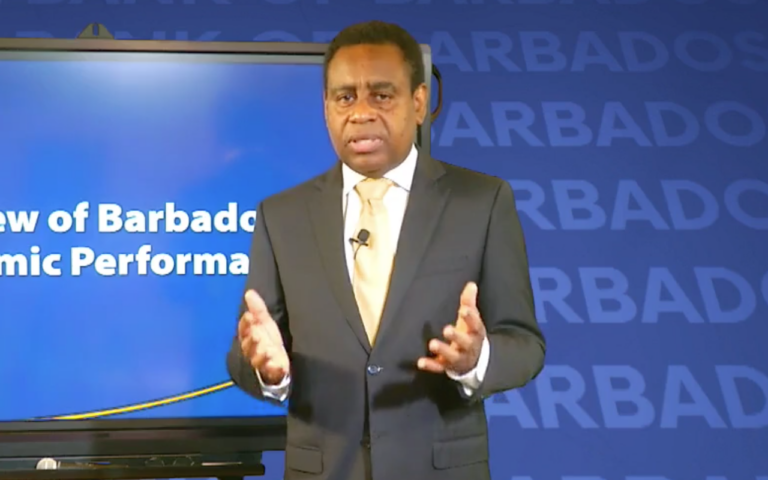
Although the Barbados economy faced another uphill battle in 2021 due to the COVID-19 pandemic, there was some measure of recovery, as evident by two consecutive quarters of economic growth between April and September.
While foreign exchange reserves grew and government revenues started to show signs of rebounding, expenditure continued to rise, as did the country’s debt stock at the start of the year.
After a prior year of turbulence, the island’s bread and butter tourism sector started to recover, which became even more apparent during the second and third quarters of 2021, due to increased access to COVID-19 vaccines in key source markets and the gradual easing of travel restrictions.
For the first three months of this year, the Barbados economy recorded a staggering 19.8 per cent decline. The gross international reserves decreased by $86 million during the first quarter to $2.6 billion.
With the COVID-19 pandemic still having a severe impact on almost every aspect of the economy, Government was forced to fork out millions of dollars to manage the health and economic crisis, with some $166 million being spent in the first quarter.
Also in the first quarter of 2021, the island’s debt reached $12.92 billion or 153 per cent of gross domestic product (GDP).
Of note was Government’s announcement at the end of January of a $3 million stimulus for close to 3,000 registered shop owners and vendors whose businesses would be closed for two weeks beginning in February.
Millions more in financial assistance were made available for other registered small businesses and unregistered entrepreneurs.
At the beginning of January, the island started to witness a sharp rise in COVID-19 cases with some 200 being recorded within the space of two days, triggering the Barbados Private Sector Association to express grave concerns.
The rising cases resulted in a two-week lockdown at the start of February, which is said to have cost Government some $25 million.
From the start of the year, a number of business owners started announcing closure of their establishments for ramped up sanitization of work areas, due to employees testing positive for the virus. This continued for several months.
As COVID-19 cases soared at the start of the year testing ramped up but then began the problem of delays in getting test results. This resulted in Government paying the accommodation costs for visitors who had to wait in excess of 72 hours for their results.
In 2021, Barbados’ ranking on the economic freedom index slipped to 92 out of 180 countries, placing it as “moderately free” with a score of 61.4 out of 100. Barbados was ranked 67th the year prior.
For the April to June period, the economy was estimated to have grown by 5.5 per cent, and while tourism, the island’s main economic sector, remained subdued it was around this time that it started showing signs of recovery as travel restrictions started to ease.
The international reserves by this time had increased to $2.7 billion or just over 40 weeks of import cover, while gross public sector debt to GDP was about 150.3 per cent.
COVID-19 continued to adversely impact the public finances, reducing revenue and raising public sector spending. This test of the economy would continue throughout the year.
Of note in 2021, were the repeated calls from Democratic Labour Party (DLP) spokesman on business Ryan Walters for Government to give more attention to the micro, small and medium-sized enterprise (MSME) sector.
Officials of the Barbados Medicinal Cannabis Licensing Authority continued the buildout of the medical cannabis industry throughout the year as it processed several licences.
Work also continued in the digital economy, with Government announcing in mid-November that it would establish a metaverse or digital embassy, which would allow Barbados to recognise digital sovereign land.
An unemployment rate of about 17.2 per cent for the first quarter, fell to an estimated 15.9 per cent by the end of June.
During the review period, repeated calls were made for Barbados to urgently diversify the economy while making the tourism industry more sustainable.
By the end of September, the economy had recorded a decline of 3.2 per cent, the international reserves stood at a healthy $2.9 billion, the debt stock started its decline to reach 146.1 per cent of GDP, and both revenue and expenditure had increased.
Throughout the year, one of the hot topics in some circles was the Government’s borrowing. Having borrowed close to a billion dollars in 2020, the Mia Mottley administration continued its borrowing streak in 2021.
As a percentage of GDP, Barbados is considered one of the 10 most indebted countries.
Government was forced to borrow about $1.2 billion during the financial year 2020/2021, most of which (about 90 per cent) was foreign debt in the form of policy-based loans from international financial institutions.
Economists have argued that the increase in debt as a percentage of the island’s GDP would naturally go up since the economic base had shrunken.
However, mixed views were shared on the rising debt, with some economists saying it was not healthy given the need for repayment of external loans which will need to be done in foreign currency, while others have argued that the current economic circumstances justified the accumulation of debt even if most of it was for providing a reserves buffer.
Since entering the Barbados Economic Recovery and Transformation (BERT) programme, Government had received some $850 million from the International Monetary Fund (IMF) up to the middle of December 2021.
One of the most welcomed moves by the Mottley administration in 2021 was the implementation of a Value Added Tax (VAT)-free day, on December 20.
Both consumers and retailers hailed the one-day VAT holiday a hit, with some calling for it to be repeated.
marlonmadden@barbadostoday.bb
The post Economy recorded both negative and positive changes in 2021 appeared first on Barbados Today.